Part 4. How to Make a Good Confession.
Several years ago Fr. Alexey Young (now Hieroschemamonk Ambrose) gave a parish retreat entitled “Orthodox Spirituality” which was turned into a six-part VHS series produced by Christian Activist Productions. Fr. Alexey was a spiritual child of Fr. Seraphim Rose, and, as these videos attest, acquired his talent for synthesizing the Patristic Tradition and communicating deep subjects in easy-to-understand language. As the videos are in a format that cannot be posted we will be posting articles, with Fr. Ambrose’s blessing, based on notes on the videos, throughout the Apostles' Fast in honor of the saints who have become masters of spirituality while yet in their earthly lives.
The seeds of holiness are planted within us at Baptism and Chrismation, but we must nourish these seeds by prayer, fasting, and almsgiving in imitation of Christ and His saints. The spiritual equivalent of the sun is the Holy Spirit—He acts upon us in the Sacraments, especially in Chrismation. In this way, the Church is the seedbed of holiness. We must water the seeds and pull out the weeds and thereby discover that the spiritual path is a tremendous adventure all about going home to God!
Secular institutions even used to help with this. Taverns, for instance, used to observe the fasts. In Russian it was against the law for establishments to provide non-fasting foods during a fast. Taverns and inns and such places had icons, vigil lamps, and so on, as a constant reminder that Heaven is watching. Old Orthodox lands didn’t even have a word for homosexuality because it was so rare.
In America we lack this outside help—it’s more like the times of persecution in some ways. Even here in our “freedom” we are persecuted by materialism, coldness, and so on. This brings the Sacraments even more sharply into focus in terms of what we need to do. In Russia even those who were not particularly observant communed at least once a year, and you could even be arrested if you didn’t.
All grace comes from Christ and is shared out in the Church. When we participate in the liturgical life and receive the Sacraments we affirm that Christ keeps His word and bestows grace on the Church to build it up. The normal spiritual life has frequent contact with Christ in the Sacraments, such as Confession and Communion which are channels of grace. In Confession we receive Christ Who said go and sin no more. In the Eucharist we receive the full humanity and divinity of He Who resurrected and ascended.
We cannot enter into the Kingdom without it and will die spiritually, as the Lord teaches us in John 6. The Eucharist is the medicine of immortality and the antidote to death. Christ thus said I am the Way, the Truth, and the Life. It is a problem that too many receive Communion lightly. We need to approach the chalice more seriously. For he that eateth and drinketh unworthily, eateth and drinketh damnation to himself, not discerning the Lord's body. For this cause many are weak and sickly among you, and many sleep, the Apostle Paul tells us. There can be physical illness from receiving Communion without proper preparation—it’s not just a nice ritual but rather the divine banquet, and the Host is the King of Heaven Who feeds us with Himself.
The founders of the Meteora monasteries were not priests, and thus were dependent upon priests to come to them. The first time a priest came they all received Holy Communion and after the Divine Liturgy they said to one another, “We have the same Blood in our veins now. By this we are true brothers.” This is how we all should think about the Eucharist. We are more closely united to one another through the Eucharist than we are to our own children. A husband and wife become one as they receive the Eucharist together, not through the legal procedure. Weddings should thus be in the context of the Divine Liturgy, whether in it, or following after it.
Receiving Communion isn’t a right but a gift. It involves preparation, thought, repentance, confession, and so on. We should receive as often as possible, but in a state of preparation! It is very important to attend Vespers or Vigil on Saturday night, and we shouldn’t receive Holy Communion if we don’t. Earlier on Saturday we should already be preparing for Saturday night and Sunday morning, with a sense of approaching the Lord as a beggar—when He comes to me, will my house be clean? What do I especially need help with? He can give me the power that I need to deal with all of it.
At the moment of receiving Christ we can and should tell Him what we need. He is ours at that moment. The whole Liturgy should be a pouring out of ourselves in preparation. Many saints used to prepare for Communion from Wednesday through Saturday, and offer thanksgiving to God from Sunday through Tuesday. We have little divine energy in our lives if we don’t do this, and otherwise we might as well not receive, and it might even be dangerous.
 Bp. Nektary Kontzevitch
Bp. Nektary Kontzevitch This idea of preparation correlates with people arriving to Liturgy just on time, or even late—it demonstrates a lack of preparation. Of course there can be unforeseen circumstances, but I’m speaking generally. You arrive to work on time to please your earthly bossy—what about He Who has power over life and death? There may be times when you shouldn’t receive if it’s your fault that you didn’t properly prepare. We need discernment though—maybe you didn’t prepare because of a stressful even in your family—then you need Communion.
The Lord expects a tithe of our time as well as our treasure and talent—we should spend more time in prayer at home and in Church. When Christ will you not watch with Me for a while, this has to do with keeping vigil both at home and in Church and the spiritual practice of nepsis, that is, of watchfulness. The energies of God enter our hearts through Communion and ascetic practices prepare the soil of our hearts to receive. The Son of God enters into our world through the window of the Mysteries.
In the West asceticism and hesychasm were last as necessary preparation for the laity, and this is a great danger for us today. St. Gregory Palamas teaches us that the healing that must take place is achieved through the sacramental and hesychastic life in combination, and outside of this combination there is no Orthodox life, no spirituality, and no theology. Without this combination we received unworthily. Grace is granted freely through the Sacraments to those who have prepared, and it is necessary to cooperate with divine energy in order to receive the benefits and to receive repentance.
The grace of the Sacraments doesn’t operate magically. In John 6:27 we are told: Labour not for the meat which perisheth, but for that meat which endureth unto everlasting life, which the Son of man shall give unto you. We must work to receive eternal life in the Eucharist. We must read the post-Communion prayers. God is an all-consuming fire. He is bliss for the saved and torment to the damned. In the lives of the many saints, such as St. Basil the Great and St. Seraphim of Sarov, fire has even been seem coming down into the chalice.
Question: What about those who don’t celebrate the true Eucharist?
Answer: They don’t even believe that they’re receiving the Body and the Blood, so it isn’t the Body and the Blood. They’ll be judged according to the life they’ve been given. We can’t judge what’s going on between them and God.
Question: Is God in us more when receive Eucharist? Is He in us when we’re not thinking about Him?
Answer: God is everywhere, filling all things. He sustains all things—if He ceased to love us we wouldn’t exist. He who dwells in love dwells in God and God in him. Perfect love casts out fear. We can’t quantify how much God we have, but in the Eucharist we receive the fullness, while at the same time His grace and Spirit are everywhere.
It’s not a question of quantity but of concentration on the presence of God.
Question: The body is a temple of Holy Spirit, but do we remain a temple even when sinning?
Answer: We are always a temple from Chrismation on, but the temple need a good cleaning from time to time. It becomes an unfit abode for the Holy Spirit and we prevent Him from acting by our uncleanness. We keep the seeds from growing, but they’re still there.
Question: How is it that we get off the path?
Answer: It’s like a trip—many things can get us off track. There’s no real guarantee that we’ll arrive safely, or at all. The spiritual life is the same—we’re in a process that hasn’t yet ended, so we don’t yet know the outcome.
Don’t worry too much about the end as long as you’re living a spiritual life. But be aware that you could have an accident, so be sober and careful. God loves us unconditionally despite sin. We can back away from Him, but not He from us.
We want to get away with stuff and still have all our prayers answered, otherwise we have a problem with God. It’s amazing that He puts up with this. In the end it’s because He has such respect for our free will.
Question: Can we crash so badly that we can’t get back on the path?
Answer: We can always get back on the path. God allows us to live as long as we need to attain salvation, as long as we don’t use it as an excuse to start the spiritual life later.
Part 6. What is Spiritual Direction What is Spiritual Deception?









